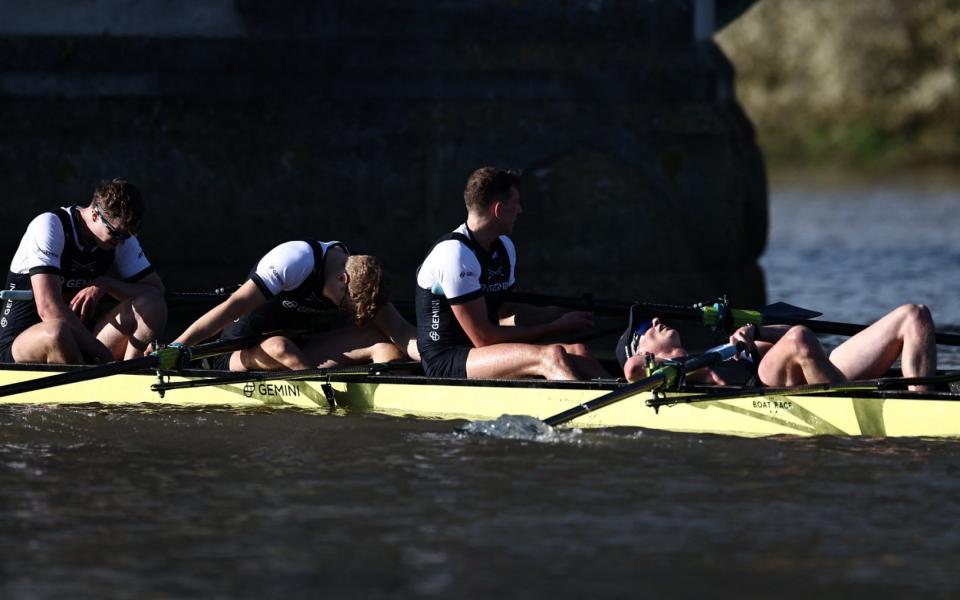Oxford complain of ‘poo in the water’ after Boat Race defeat

Oxford rower Leonard Jenkins complained of an outbreak of E.Coli in the camp after defeat against Boat Race rivals Cambridge on the Thames.
Three days after Oxford’s coach Sean Bowden had slammed the “national disgrace” of polluted waterways in an interview with The Telegraph, the dark blues lost rowing’s annual showpiece by three-and-a-half lengths, belying their status as pre-race favourites.
“We’ve had a few guys go down with E.Coli strain,” said Jenkins, the Oxford No7. “I threw up this morning but decided to row. I am not sure whether that was the right decision.
“It’s not ideal to have so much poo in the water.”
Later, the Oxford cox William Denegri filled in a few more of the details.
“This week we’ve had three people who have had to miss sessions because they have had stomach bugs,” he said. “It’s not an excuse but it’s certainly not helped our campaign.”
Those affected include Oxford’s bow-man Jelmer Bennema, who is an overseas recruit from the Netherlands. At the conclusion of the race, Bennema had to run inside to vomit, later explaining he might have to skip the traditional post-race dinner.
Activists from a pro-Palestinian group attempted to disrupt the race by gluing themselves to Chiswick Bridge at Mortlake. Elsewhere, a man was arrested on suspicion of a terrorism-related offence at a pro-Palestinian protest in central London, at which hundreds of thousands gathered to demand an immediate ceasefire in Gaza.
Thames pollution dominated the build-up to rowing’s big annual event, after Tuesday’s revelations from the Environment Agency involving a record 3.6 million hours of sewage discharges into British rivers last year.
More specifically to the Thames, surveys found an alarming average of 2,869 E.Coli colony forming units (CFU) per 100ml of water in 16 tests around Hammersmith Bridge, which is almost three times the recommended limit.
James Wallace, chief executive of River Action UK, said this week the consequences of infection could include “very severe symptoms, which could lead to sepsis. And sepsis can not only lead to hospitalisation, but death. That is a very, very major concern.”
In response, Boat Race organisers hardened up their stance on hygiene. In a statement, they said that guidance had been issued “regarding the covering up of open wounds, regular handwashing, a cleansing station [ie showers] at the finish area and highlighting the risks of entering the water”.
In a disappointing termination of one of sport’s great traditions, the 2024 Boat Race was the first for decades not to feature the dunking of the victorious cox.
For many years, the cox immersion was such a fixture of the Boat Race programme that it featured in the BBC’s programming schedule. But it was off the agenda here.
Hannah Murphy, who was the first cox to claim victory when Cambridge’s women scored a comfortable seven-length victory, was hoisted into the air by her crew-mates, although coach Paddy Ryan said this had not been planned in advance.
“It is what it is,” said Murphy. “We want to support the research that is being done and the guidelines.”
“That was impromptu,” said Ryan. “It was probably led by the press on the other side who said ‘Come on, show us something.’”
As for Bracey, who coxed the victorious Cambridge men’s eight, he was still unaware what fate awaited him when he spoke to reporters after the presentation ceremony. Asked if he would object to being thrown into the Thames, he replied. “No, not at all. We’ve been splashing around in that for weeks.”
But Rob Baker, who coaches Cambridge’s men, stepped in at once. “You’re not going in,” Baker told Bracey. “I know he’s alright to [do it], but we don’t want to risk it. We’ll throw a bucket of clean water over his head.”
Yet Baker’s views appeared not to have reached the ears of Goldie, the Cambridge reserve crew, who also won their race and were then pictured celebrating in the water just after the finish line, which arrives near the same spot – Hammersmith Bridge – where those dangerous E.Coli readings have been collected.
In contrast to Oxford, Cambridge had no health issues in the camp. “We’ve been very lucky,” said Baker. “But we’re obviously very aware of the situation. We’d like cleaner waterways, and we’d like to not have so much risk for our athletes, but we’ve just tried to follow all the precautions and be as safe as possible.”
Asked whether Cambridge’s victory had sunk in yet, Bracey added: “It’s now starting to dawn on me how sick this is.”
He seemed unaware of the irony.

 Yahoo Sport
Yahoo Sport 




































































